When I was told that I would be meeting with New York Times Bestselling author Max Brooks at this year’s New York Comic Con, I imagined I’d be gazing into the sun. I imagined being frisked and cavity-searched by hulking men in black blazers with earpieces that connected to wrist microphones who wore dark shades and permanently humorless expressions. I imagined we’d be shepherded through the inevitable catacombs beneath the Jacob Javits Convention Center that allowed celebrities like Chris Evans and Tom Hiddleston to move through the space undetected and unperturbed. This was the man that wrote World War Z, The Zombie Survival Guide, Devolution, The Harlem Hellfighters, and three books for younger readers set in the world of Minecraft. This is the son of the man who literally wrote The History of the World (Part 1), and the woman who taught the deaf, dumb, and blind to read. I was convinced I was meeting royalty.
Setting up the interview prior to the convention kicking off, I learned that this year there were three separate press areas: A lounge in the River Pavilion near the Empire stage, another lounge near the Professionals Area in the Crystal Palace, and a Media Room in the River Pavilion. Using my experience from the prior year, I imagined the larger place, that being the latter Media Room, was the area laid out with multiple tables where members of the press, staff, and guests escaped the throng of the floor to relax, recharge, and regroup. As such, I decided against both lounges and suggested the media room. I didn’t discover until the day of, however, that my assessment was incorrect, and I couldn’t contact Max directly to let him know that, so I met him at the busiest room in the convention on center on Thursday, the first day of the Con.
I suggested we try to use one of the media rooms across the floor, and he agreed, so we walked and talked a bit, without harassment or bombardment. We retired to an interview lounge that wasn’t being used and spoke for perhaps nine minutes when we were ushered out. We ended up back at the large area of multiple circular tables, resuming our conversation as though nothing had happened. It quickly became evident that no one in the room knew what Max Brooks looked like, but as our conversation spiraled outward from Minecraft to his larger career, ears perked and heads turned, interest piqued.
Everyone, at least in this space, knows Max Brooks.
The thing is, Max Brooks doesn’t seem to know he’s famous. As an author, he has the benefit of being known for his words rather than his face, so he often enjoys a healthy bit of anonymity. Once someone does discover his identity, however, they’re compelled to meet the man and share their appreciation. As we talked they arrived, two by two as if toward an Ark, and politely interrupted to say how much they loved his work. At these admissions, Max often had the same response: “Thank you so much. What’s your name?”
Max wants to meet you. He doesn’t accept your compliments as roses tossed at a dictator’s feet – he wants to know you, your name, and thank you personally. He’s not concerned with collecting accolades or followers or awards. He’d rather make connections. With people. He’s a genuinely approachable and affable man. Interestingly, he genuinely seeks out the most absurd eventualities so that we, as a species, might be prepared to combat them. That is his day job, actually, as a Senior Non-Resident Fellow at the War Institute at West Point.
The Modern War Institute is a military think-tank, and it “is” not West Point, it is “at” West Point. Now to us that makes no difference but in the military world that’s a huge difference. Because if it were actually associated with West Point that would make it a Federal institution and I would be a Federal employee and then everything I say would reflect the government. So, no – it is a separate independent think-tank. It is primarily regular army personnel but I’ve been invited to be part of it and they are what the title says: they study war. They study how we hurt each other, every aspect of it. Nothing is off the table. We did one conference where there was one guy who showed up… and I’ll say I’m pretty civilian; I’m a pretty civilian guy. But I looked like General Patton next to this guy. Like, what is he doing here? He stood up and gave the most amazing lecture about GRINDR, about how a Chinese company owns GRINDR and even though it’s not their government directly, they have no privacy rules, so the reason it’s relevant that a Chinese corporation owns it is that their government can break in and look at who’s on it and gather what the Russians call “Kompromat.” So that way, say, when China is ramping up to invade Taiwan, and some Senator is about to make a speech on the floor of Congress, he gets an email saying “We know about you and Miguel. You’re not gonna make that speech.” So nothing is off the table when it comes to conflict. I tend to study things that could become violent but aren’t yet. For example, I did a whole article on Monsanto and the idea that Monsanto seeds are now intellectual property. The Supreme Court decided that. They said that if you’re a farmer and you plant a field of Monsanto seeded corn and the corn ripens you can’t take a little bit of those and replant them next year. Because that would be, legally, the same as copying a DVD. So for the first time since the birth of the agricultural revolution, farmers have to go to Monsanto and buy new seeds every year instead of banking a little bit. That’s never, ever happened. They own a majority now of our corn and our soybeans. So that’s phase one.
“That’s commodifying a renewable resource.”
Yeah, that’s an essential resource. That’s not sneakers, and that’s only phase one. Phase two, they were sold to Bayer, and Bayer is a foreign company. Even though we have a security treaty with Bayer, and Germany is a NATO ally, there is nothing in the bill of sale that says that Bayer can’t just sell Monsanto to China for double the profit. Which means that China would then have intellectual and legal control over our food supply, and they might be able to do a food blackmail the way the Arabs did an oil blackmail back in the 70s when the Arab countries attacked Israel and said “either support us or we’re going to cut off your oil” and they did. Now Monsanto, and whoever owns it, could do that with us. That’s set against the backdrop of the United States as the only major power in world history that has never been vulnerable to food blackmail. Everybody else, since the dawn of time, great powers have always had somebody with a knife at your throat saying “We can cut off your food supply.” Not us. Even in our Civil War we were growing enough surplus wheat to sell to Great Britain. That’s how food rich we’ve been… and that just changed. So that’s the kind of stuff I write about.
War seems to preoccupy Max Brooks’ thoughts, which is a strange detour for a professional who started his career as a writer at Saturday Night Live. Now, war creeps into seemingly everything Max writes, whether it’s historically accurate or the conjecture of a zombie apocalypse or a Sasquatch attack or even the fiction of terrorist organization COBRA from G.I. Joe. So how did Max Brooks pivot from war to children’s books… then back to war? We discussed that, along with playing in the sandbox of established IP, being the old guy in the room, and the infamous film “adaptation” of his breakout 2006 book that resembled his work in name, only.
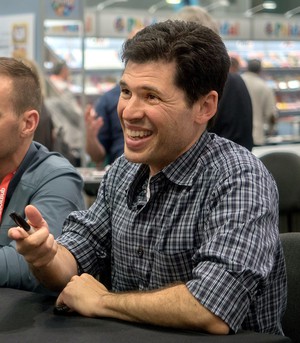
Eric McClanahan – Alright, so we’re talking about Minecraft.
Max Brooks – We are talking about Minecraft.
EM - How did you get into playing Minecraft?
MB – I got into it because my son was playing it. And initially when I was playing it with him I realized “Holy Shit, this is the best teaching tool possibly ever!” There are so many great lessons embedded in the game, if there’s someone there to tease them out. Without getting too deep into the weeds about it, the generation coming up is in a lot of trouble. Because we’ve all been educated in a model that was invented for the Industrial Revolution. That model was invented to standardize us and that’s okay. However, this notion of memorizing facts and then spitting them out onto a standardized test with a clock ticking doesn’t work anymore. It did work; it worked great!
EM – I mean, we turned out great.
MB – [laughs] Yeah. I just learned that the school bell ringing is meant to simulate the factory floor. So the whole education system is meant to get us ready to work in the factories. The factories are all gone. They’ve gone over to other countries where there are no human rights and they make cheap stuff. Kids coming up are going to have to learn to be free-thinkers, entrepreneurs, they’re going to have to recover from failure, because there’s going to be so much, right? They’re going to have to be so fluid as far as adapting to new technologies, new jobs, new ways of doing stuff. When we were young, my generation, we had our banner movie – REALITY BITES. Ethan Hawke does this wonderful soliloquy where he’s like “What am I supposed to do, man? Work in a factory like my dad?” No!
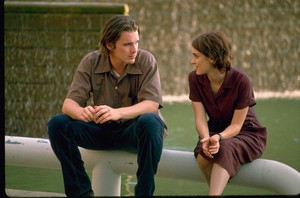
EM – Not an option!
MB – You’d be lucky to get that job. That job is gone, dude. So kids today are going to have to basically be their own boss and always be looking out for themselves and there’s really no system in place to train their brains for that. ‘Cause school ain’t gonna do it. But, holy crap, there’s a video game that can actually train you to do this. Where you can learn to take everything in steps – punch a tree, make a crafting table, make tools, make the tools to make something else. Wow! Recover from failure. I had a house that I built once – big, beautiful wooden house that I made in Minecraft… burned to the ground. What am I going to do? Cry about it? I’ve got to start over. So when I was playing this game I thought “this game can teach you how to live your life.” Then Mojang [Studios, the Swedish video game developer responsible for Minecraft] came to and they said “Hey we’re doing Minecraft books and how would you like to write the first novel?” I was like “Hell yeah!” and God bless them because I came to them with a whole plan. I was like “Listen, I want to do life lessons embedded in every scene in this book. Every challenge I want this character to learn and grow and at the end I want there to be this whole list of life lessons.” They could’ve been like “No, absolutely not.”
EM – Just like “Have fun. It’s for kids. Keep it light.”
MB – That’s exactly what they could’ve said, but they didn’t. They said “Great!” So they let me and then we were off and running.
EM – The book jacket (for The Village) says “Minecraft Trilogy” and that this is the last one. Is that true?
MB – I think so, yes. I think it comes full circle. Minecraft, book one, The Island, is about how to live with yourself. All those life lessons: patience, planning, how to recover from failure, and obviously the end – growth doesn’t come from a comfort zone. You’ve got to keep pushing yourself. So, book two, The Mountain, is how to live with someone else: how to be a friend, how to compromise, communicate. Then book three is the logical progression, which is how to live in a community. So, I’m not sure where you go from there… unless of course we discover aliens and we’re not alone in the universe, but then that’s just a bigger community.
EM – Space Vessons.
MB – Yeah, so unless I wake up tomorrow and exclaim “I’ve got book four!” this is, in my mind, the end.
EM – So these are books for, quote, younger readers…
MB – To me they are primarily for younger readers but also very important for their parents. I was read to a lot when I was a kid, so I wanted parents to be able to read this to their kids, with their kids, and take note of the lessons. Under no circumstances do I believe that kids are going to be reading the books and seeing at the lessons at the end of each chapter and saying “Aha, I am wiser!” Because that was not us, right? We spent our youth having grownups yell stuff at us and going “Yeah, whatever. I know what I’m doing.” And then as we got into our thirties and forties we go “Oh, that’s what they meant. Right!”
EM – Like, oh, the stove IS hot!
MB – It’s the kind of thing like, last night, I was watching BEVERLY HILLS COP II, and at my age I suddenly identify with Inspector Todd. ‘Cause now I’m a parent, so now I get it. When you’re young you identify with Axel, like “Don’t worry, I got it, I know what I’m doing. I’m cool.”
EM – “And that’s going to save me.”
MB – Exactly! And now that I’m older and I’m middle-aged and I’m a parent, I’m Inspector Todd, and I’m saying “Do you have any idea what’s going to happen if you screw this up?” So, yeah, I wrote it for kids but I also wrote it for parents.
EM – When you were writing did you have a target demographic in mind? Like who is reading this book, or having this book read to them?
MB – No, I really didn’t have any. Well, the first book, no. The first book I wasn’t sure, you throw it out into the universe and wonder who’s going to come to you. But I do find it tends to be younger, I don’t want to say an exact age because people grow up at different rates, but I considered myself. You know, I was young, and in 8th grade there was another kid who seemed older though we were the same age, and he’d be like “yeah, I know stuff.” I was not that kid. I think I’m still not that kid. So, no, I didn’t have a demographic in mind, but I did have skewing younger. At any age where you still can have a conversation with your parents - I think that’s the appropriate age.
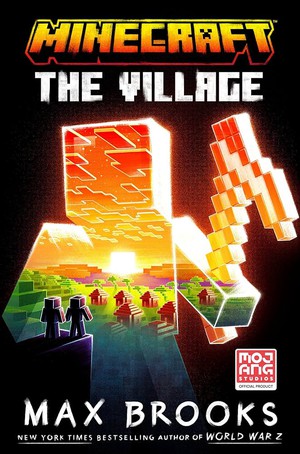
EM – Okay. The new one, The Village, I think does grow up. There’s bigger themes, and there’s the big theme of war, which is a very real thing right now for all of us, and especially for young people, to deal with. Was that intentional?
MB – Yeah, because I’ve lived long enough to know that wars happen, and they happen too often to people that did not ask for them. But I wrote it before Ukraine and certainly before what’s happening in Israel right now, but I did write this with an eye to “You know you’re going to grow up in a world where there’s things called ‘wars’ that are going to happen, and you may not want it, you may not ask for it, but they may come for you and you’re going to have to know how to survive it.”
EM – Okay, a bit of spoiler territory for The Village – the resolution of the war… just… happens.
MB – Which is how wars happen sometimes.
EM – Yeah, I was going to ask if that was deliberate commentary on that theme.
MB – That’s the thing. I don’t want to spoil it too much but so much of surviving and winning a war is just endurance. I mean you’ve got to have the right tools and the right strategy but you’ve also got to have the heart to just last. That’s what’s literally happening in Ukraine right now is Putin is counting on just wearing them down. And that’s so many wars. So many wars is the enemy just going “I’m going to grind you down where you just lose the will to fight” and you go “okay.” That’s why you need a [Volodymyr] Zelenskyy or Winston Churchill to say “No, we must keep fighting! We must go on! It is a very, very dark night but there will be a dawn.”
EM – So, Guy and Summer – are they avatars of anyone you know personally?
MB – You know, they’re a mix of different people I’ve met along the way. Part of it’s me. Summer is part of so many friends that I’ve got. I mean, there’s one scene in book two where he says to Summer “I will never leave you again.” I said this to a friend of mine once and her voice sort of cracked high when she said “Thank you” so that was an exact moment in time. So yeah, these are amalgams of people that I’ve met and life I’ve lived. That’s another thing, and this goes into – I don’t make anything up. Even for the game, itself. When it says “the following is based on true events” – it is not based on me watching YouTube videos of Minecraft gameplay and saying “Oh this looks like fun.” No, I’ve played it.
EM – You’ve logged the hours.
MB – You have to do that. Also, I come from the point of view of a fan with everything I write. I know that feeling and you know that feeling when we’re watching an established franchise in the hands of someone new taking a lazy out. Just clocking out. “It’s five o’clock. I’m going home.” I promise you, I will never make you feel that way.
EM – I appreciate that. So the first one came out in 2017 and when did the second release?
MB – The second one was 2021, somewhere around there.
EM – And in between that time we had a little pandemic.
MB – I wrote that whole second book in the middle of the pandemic.
EM – Now, Summer, was she something of an amalgamation of us at the time? With our solitude and our fears?
MB – Yes. What was funny was that I had intended book two to be about making a friend. I didn’t expect it to be so important. Because, you know, I’m a parent, and I’m watching these kids lose their social skills because they’re all bubbled up, but I knew, duh, the pandemic is going to have to end sometime and we’re going to have to go back out into the world with one another. So, that was really important for book two.
EM – I noted a lot of pop culture references throughout the series. Allusions to literature and movies. Tell me about the importance of including that, of making that pop culture shorthand.
MB – Well, part of it is we don’t know exactly how old these characters are. We assume that they are children who’ve spawned into this world but they may very well be adults who’ve failed to launch. Let’s just take a side note to say that all of the life lessons in all three books… I have yet to master. So I’m not writing from the place of “Listen young ones…”
EM – “Wise old man!”
MB – “Yes, partake of my wisdom.” No, I’m writing from the place of “Listen, I know this stuff is true and I’m right there with you. I’m struggling with it. I’m trying to put it into practice. So, you know, we’re side by side here.” The pop culture references, I think, are important because, number one, they make it real. I remember growing up when I saw people in movies reference other movies I thought “oh, they’re like me.” It’s like when I saw my first Tarantino movie. “This guy gets me.” But also it’s really important to identify with the parents, too, so some of that stuff is in there for them. Some of the references are going to be a little bit older that the kids aren’t going to get but that’s okay. You know, SESAME STREET does that all the time; that’s their model.
EM – Yeah, like that GAME OF THRONES thing they did a while back. That was like “what?!?”
MB – They did a LAW & ORDER episode the other day. They do that so that parents and kids can sit and watch it together. I will say, I had one pop culture reference that made me feel so old. I became my dad. You know, my dad has had pop culture references in his movies that I just didn’t get. There’s a scene in BLAZING SADDLES when Mongo is riding into town and a Mexican extra says “Mongo Santa Maria!” and runs. And I just thought it was funny and my dad goes “You know Mongo Santamaria was a very famous Cuban jazz drummer” and I go “Yeah, I didn’t get that at all.” So, I had that happen in this book. So, Guy is underwater, he’s breathing, and he realizes what it’s like to walk underwater and he goes “Oh, this must be what it’s like walking on the moon. Isn’t there a song about that?” Both my editor and the Mojang team were like “What song are you talking about?” [silent] I thought “I’m just going to take my calcium supplements now…”
EM – Yeah, I get that a lot. You really like to present your works as first-hand accounts. World War Z was the Oral History. Devolution was Kate’s journals. These Minecraft works are Guy’s journals with Summer’s voice occasionally. Where does your fancy for this particular literary device come from?
MB – Honestly the story determines the narrator. When I sit down to write a story I wonder “what’s the best way to tell it?” So like with World War Z, how the hell do you tell the story of an entire planet going through a zombie outbreak? What would be the best way to do that?
EM – It can’t be one guy in Georgia?
MB – Right. By the way, that’s why I did World War Z. It’s because I was sick and tired of this giant global crisis being told through the eyes of like one guy, or a tiny little group. It would be like trying to understand World War II watching only Private Ryan.
EM – Right.
MB – Now when I was a kid my mom gave me the audiobook of The Good War by Studs Terkel. It’s a book of interviews with people who’d lived through World War II from all over the planet and every different walk of life. So I thought, “That’s it! That’s what I’ll do.” Likewise, with Devolution, it had to be a found journal because how else could you tell it? Because if she was telling the story then we knew she lived and it seemed the best, most natural way, to tell a complete story. This one: same thing, where you’re finding a journal. The funny thing is I got the idea when I was a kid watching THE LAND THAT TIME FORGOT. I don’t know if you recall that old movie with Doug McClure but it starts with a canister falling into the ocean and it floats and it floats and then some guy opens the canister and inside is a journal which starts with “I wouldn’t expect you to believe the story I’m about to tell…” and I was hooked. Like, “There we go! That’s it!”
EM – It reminded of Mary Shelley’s Frankenstein framing device. Like it’s the captain writing his sister telling her the story that Victor told him and in Victor’s story he’s quoting the monster. It gives you this ability to leave some dark spaces in there because this story is going from mouth to mouth to mouth.
MB – And I screwed that up the first time around! The first draft of Minecraft: The Island I still had Daniel Defoe in my head and I was approaching it like Robinson Crusoe, because I had just reread it. The problem with Robinson Crusoe is he’d already been rescued and everything’s cool – I think it’s like twenty years, or you get the sense that it’s like twenty years later. Probably not because they only lived about twenty years back then, so probably like two years later. But you get a sense that you’re visiting Robinson Crusoe in his house and he’s telling you his story and everything’s cool, and the language of my first draft was very much like that and it wasn’t exciting enough. And they sent me back to the well and said you’ve got to rewrite this. I asked “you’re telling me I have to rewrite this whole book from page one?” and they were like… “yeah.” So, nine drafts later, I had the right voice.
EM – I think that, in itself, is a great lesson: that the first go at it, even if you’re Max Brooks, isn’t going to always be out of the park.
MB – Oh no! Now, I love the movie AMADEUS, but I think it sends a completely wrong message for people aspiring in the arts. I’m not saying Mozart wasn’t like that; maybe he was. He’d just go out on a bender and just come in stoned and say “I’m going to write a brilliant symphony” and then he did. Anyone else wanting a life in the arts, I always tell them “This is a job.” I’d tell them what my mentor Alan Alda told me. He said yes, the first draft can be exciting and fun and passionate – you just feel like the muse is speaking through you. Then, you’ve got to go to work. He’d tell me the line between a professional and dilettante is the rewriting. So yes, everything I do, there are pages and pages of notes and you take the criticism, and that’s a job in itself. Because you take the notes from, hopefully, people you trust and then you have to sift through them and ask “Do I agree? Do I disagree? If I disagree, am I just angry or defensive? What the Hell do they know?” And that’s another part of the process: finding a team of people that you do trust. My wife is a playwright, so we have to go to a lot of theater. Oh God!
EM – Some good, some not so good?
MB – Some good, some really not so good. And you really know you’re in trouble when after they do the show they come out and say “well now we’re going to do a talkback.” Are you out of your mind?
EM – “Are you workshopping me?”
MB – You don’t know me! You don’t know anybody in this room and you’re suddenly opening up your play to criticism from strangers? NO!
EM – “I’m just some guy with twelve dollars!”
MB – Right! Like, I could’ve had a bad day! Now obviously part of being any successful artist is learning to take criticism - but criticism from people who are vetted, who know that you’re trying to get to a certain place and can say “okay, I want to help you get to where you want to go.”
EM – Your work spans so many different genres. You kind of just do whatever you feel like at any given moment. Why such a wide net?
MB – You know, it’s funny, because on the surface it seems very eclectic, but one layer deeper it’s all the exact same theme.
EM – That being?
MB – That being “adaptation.” Adapting to crisis.
EM – Yeah, I can see that now.
MB – Exactly. All I have to do is say that and you get it. Because it’s zombies, it’s Bigfoot, it’s Minecraft, it’s even World War I, my graphic novel, The Harlem Hellfighters. It’s all the same theme, which is someone - a person, a group, a nation, a planet, what have you - we’re all just doing our thing and everything’s cool and then suddenly it doesn’t work anymore. And we’re in a lot of trouble, and we suddenly need to become different versions of who we used to be if we’re going to get out of this. All the same theme.
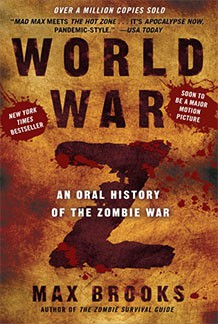
EM – I know you weren’t thrilled with the film adaptation of WORLD WAR Z. It was more Romero than it was Howard Zinn, I think.
MB – Well, here’s the thing about the movie: I have absolutely no right to complain because a lot more people read my book. I will admit, when we were getting close to the movie opening, which is a story I’ve told a million times but it’s an important story and a true story, is when the movie was about to open I was watching TV and they showed a clip of it – “Coming up: The World is Invaded by Zombies and only Brad Pitt can Save us!” I saw it and I thought “Oh God! Oh no!”
EM – “They’re going to think I wrote that!”
MB – And that’s a really good point. I’m glad you made that point, because my wife said “call Frank Darabont.” Frank Darabont is a dear friend of ours and for your readers that don’t know the story of THE WALKING DEAD or think they know the story, the real story of THE WALKING DEAD is Frank Darabont took this comic book that most of America had never heard of and went to AMC and fought tooth and nail. Because at the time AMC was of the thought “We’re the MAD MEN channel! Zombies? That’s bullshit.” But he said “No, I promise you I can make this a classy, really well-done TV show. The first of its kind. I’ve got a crew that know what they’re doing. We’ll be on time and on budget. We will make this happen.” And boy, they fought him! And he did it, and he won! Everybody loved the first season of THE WALKING DEAD, and the reward was… they fired him. They were like “Well, now you’ve got it up and running. You can fuck off.” They let him go to Comic Con and let him promote Season Two and then he went back to the set and they were waiting for him to fire him. And let’s be very clear, on the record: Nobody stood up for him. And I mean nobody who was in position to do so. Everyone now is like “oh it was such a tragedy” – No, it wasn’t a tragedy; you were right there! You didn’t do shit! So Frank knows what it’s like to really be at swordpoint, in his eye, so my wife says “call Frank.” So I called him, or emailed him, I should say, and said “Oh I’m so worried. Did they ruin my book?” And Frank writes back saying “they didn’t ruin your book. Did they take your book off the shelves and rewrite it? No. So what are you complaining about? You have your side of the story.” Like you said that people are going to think that I wrote [that movie]. He said “no one’s going to think you wrote that because you have your book. Trust me, as a guy who was written a lot of screenplays that have been really ruined by certain directors and have been on the screen with people thinking I wrote that, you get to be pure. So you’re fine. This is great.” And then Frank, God bless him, he’s such an angel, he passed along my email to his friend who then wrote back to Frank and said ‘Listen, tell your friend Max, number one, I really liked his book. But most importantly, we as authors never sign movie deals in the hopes that the movie will be true to our book. We sign the deal to give our book a second life. We want our books to be read. That’s all we all want, and if a movie brings attention to our book then what’s the problem? All the best, Stephen King.” I took those words to heart. So when you’ve had some sense slapped into you by Stephen King and Frank Darabont all I have to say is Thank you, Brad Pitt. Thank you for bringing all this attention to my book.
EM – So DEVOLUTION is in production now?
MB – No.
EM – But it is being optioned?
MB – Yes.
EM – And are you involved?
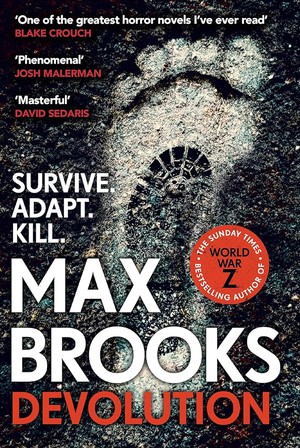
MB – Yes, I wrote the first draft and at this point James Ashcroft is on the second draft, and I read the script and thought Damn! He gets what I’m trying to do with this! He really does. I don’t know what’s happening now, with the strikes, and strikes on top of strikes, and the pandemic. My God, if there were any way to further complicate this! I keep expecting to hear “Okay, the good news is the movie is going to be filmed in Israel starring Drew Barrymore.”
EM – That would be all the icing on the shit cake.
MB – Yes, other than that, everything else has conspired to hold it back.
EM – Do you think that this Minecraft trilogy might find life beyond the page?
MB – That’s a really good question. I will say that when you write for somebody else – I’ve been extraordinarily lucky that they didn’t reject it. Mojang and Microsoft could’ve easily tried to write through me and then I wouldn’t have done it. So they were very hands off and I was very lucky for that. But I’m not privy to their media plans for Minecraft. There’s been a Minecraft movie in development since literally before I started to write the first book. So I’m not part of that at all. And you probably know just as well as me that franchises are the point now where they have one anchor project, and then depending on how it does they build out from that. So, I think, before there’s any talk about this trilogy they’re probably focusing everything on the Minecraft movie, if I were to venture a guess. And then we’ll see what happens. But yeah, as a trilogy it would probably would make a good limited series, maybe. Another thing that I’d like to stress and I’ll always say any time someone lets me open my mouth is that the audiobooks are really important to me. Because I’m very dyslexic, grew up very dyslexic, and audiobooks saved my ass from God knows what. You actually sparked the memory because you mentioned a movie series; well, we already have the audio series. Jack Black read the first one and Sean Astin read the next two. As great as they both were, I cheated, because I went to high school with both of them. I wrote them both like “Hey, would you mind?” and they said yeah, sure. They’re both freaking brilliant, and you’ll appreciate this, and this isn’t a spoiler, but I added an Easter egg in the third book. At the very beginning of the third book when they’re leaving the mountain, Summer stops and looks back, and Guy thinks-
EM – “This is the farthest I’ve ever been from home-“
MB – He’s like “Wow, this reminds me of that movie. I can’t remember the name of that movie but man, that actor was awesome!”
EM – I was curious who you were referring to so now I know.
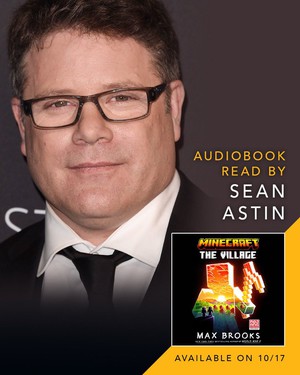
MB – Yeah, that’s Sean Astin, because that’s his line. And because he’s an amazing actor, so I gave him a little thank you.
EM – I saw in the programming for this Con that there’s a panel called “Writing in Others’ Playground” about writing with established IP as a newcomer, and there’s even a Minecraft writer speaking on the panel. Is that something you might check out?
MB – I should check it out, because I find it very interesting, because every story is different. Like when I was writing for G.I. Joe there was massive interference.
EM – Well it’s an IP that’s been around a bit longer than Minecraft so there’s more legacy at play.
MB – That and, it took me a while to get to this because there were a lot of fights, but I realized “I’m not writing for G.I. Joe – I’m writing for a toy company that uses G.I. Joe to sell toys.” That’s the real goal there so they have a business to protect and they don’t want some uppity artist trying to say something. This is when the Iraq War was melting down and I was trying to put some reality in this; like we can’t do this 1980s funtime.
EM – Lasers and no one dies.
MB – Right! No, this is really happening and you have to do this. And they said “No you don’t.” There was one moment where I had a character being waterboarded, and they came back and said “You can’t have waterboarding.” I said “but it’s happening” and they said “that’s exactly why you can’t do it.” And I said “So I can literally cut someone in half with a laser but I can’t do that?” and they said “nope.” And I realized fair is fair – it’s their company and if I don’t like it, I don’t have to work for them. And again, about the third book, as you mentioned, it is very grown up. And that’s another reason I was so pleased there was less interference from Mojang, because I touch on some heavy subjects. There’s not just war; there’s also economics. We talk about who can work and who won’t work. I mean, that’s pretty serious stuff.
EM – There is some heady stuff. Even in the first book when Guy comes to the conclusion that he doesn’t want to kill for food. To give that option to a young person who may not have that agency, to know that that’s an option, I think that in itself is quite revolutionary and heavy.
MB – That was a huge thing because I also didn’t want to take a hard stance against people that want to eat meat, so that’s why in book two I made it very clear, when we have that big scene where he’s crying “I won’t eat meat” and she’s just like “Then don’t.”
EM – “Just say that.”
MB – Yeah. “Just say it and don’t be on my case if I want to.” He says “no, if you want to, it’s fine. Go hunt. Go fish. You do you.” This notion of tolerance, of live and let live, I thought I might get a lot of pressure from either side. And that’s the only problem with the trilogy: I’d heard somebody had written a criticism of book one, saying “we live on a sustainable farm and you’re taking a stance against eating meat and this is really horrible” and I just want to say “no wait, wait. Wait until book two! I’m not saying your life is wrong, I’m just saying there’s another way to live and that’s okay and we can all live together.”
EM – Speaking of response and hearing from people who’ve read the books, the Aesop’s Fables reference – did that come to you or did you introduce that?
MB – That came to me because my mom used to read those to me. Basically I am who I am because I had the mom that I had and she was always trying to teach me stuff and always reading Aesop’s Fables and this was a great chance for me to kind of pass that forward, because the crazy thing about all those lessons and all those fables is that we haven’t changed.
EM – Right? We’re still the same “people.”
MB – Yeah. We have atom smashers and space flight and microburst lasers but we’re still the same people who used to wear furs and live in caves. Our basic psychology, our wants and needs, it’s the same stuff. So the fact that 2,000 years ago- actually, Aesop was what, 3,000 years ago, good Lord! It was a long time ago. That someone could write something then and you could read it now and say “yeah, that’s us.”
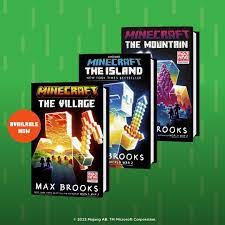
After we’d been talking for forty minutes, and everyone around us was craned in our conversation, I realized I’d taken too much of this good man’s time, and there was actually another outlet set up a table away from us that had booked an interview, as well. We wrapped up and I gulped water, my throat dry and my face vibrating from smiling too much. Later that day I met Max at the Penguin Random House booth on the show floor and got my copy of The Village signed, which he inscribed with the phrase “um, we need this room” as a nod the adversity we’d faced so many hours ago. Talking to Max Brooks was a highlight of my career thus far, and I was alarmed how much we had in common, despite the fact my dad isn’t one of the funniest men alive. What I ultimately took from our discussion is that humanity will always find ways to hurt itself, and time waits for no one. Though we are the same people we were 3,000 years ago, the world we’ve created is not. We owe it to ourselves and one another to expect the unexpected, never ignore the absurd, and always be learning.
All volumes of Max Brooks’ Minecraft Trilogy – The Island, The Mountain, and The Village – are available in print and audio from Penguin Random House.
Until next time, take care.
-McEric, aka Eric McClanahan-
